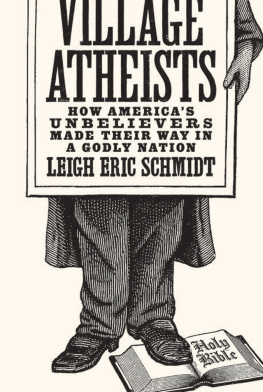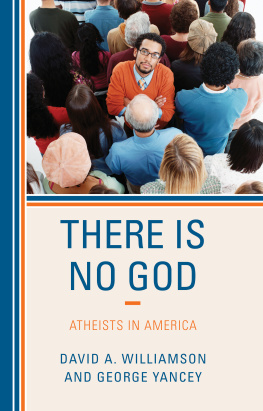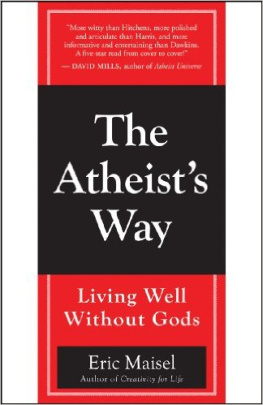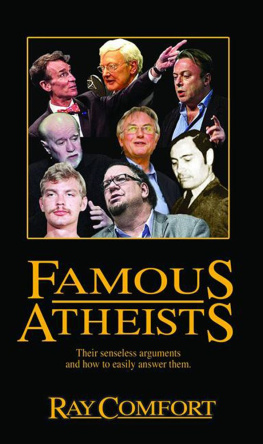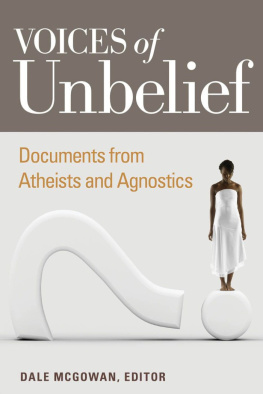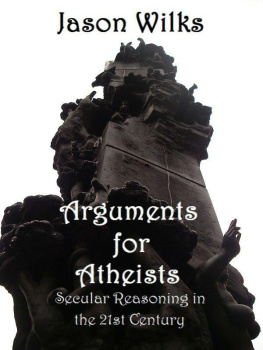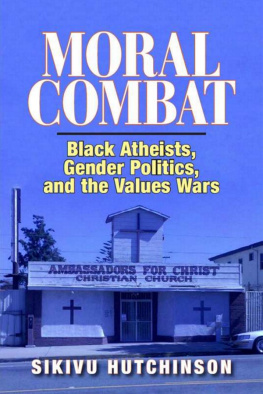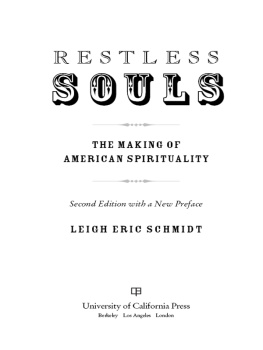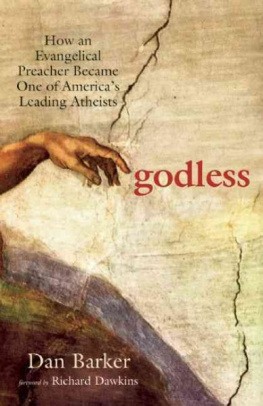
VILLAGE ATHEISTS


COPYRIGHT 2016 BY PRINCETON UNIVERSITY PRESS
Requests for permission to reproduce material from this work should be sent to Permissions, Princeton University Press
PUBLISHED BY PRINCETON UNIVERSITY PRESS
41 William Street, Princeton, New Jersey 08540
IN THE UNITED KINGDOM: PRINCETON UNIVERSITY PRESS
6 Oxford Street, Woodstock, Oxfordshire OX20 1TW
press.princeton.edu
Jacket design by Chris Ferrante.
Jacket illustration courtesy of Dover Books, ed. Carol Belanger Grafton.
ALL RIGHTS RESERVED
Library of Congress Cataloging-in-Publication Data
Names: Schmidt, Leigh Eric, author.
Title: Village atheists : how Americas unbelievers made their way in a Godly nation / Leigh Eric Schmidt.
Description: Princeton : Princeton University Press, 2016. | Includes bibliographical references and index.
Identifiers: LCCN 2016011082 | ISBN 9780691168647 (hardcover : alk. paper)
Subjects: LCSH: AtheismUnited StatesHistory19th century.
Classification: LCC BL2747.3 .S37155 2016 | DDC 211/.80973dc23
LC record available at https://lccn.loc.gov/2016011082
British Library Cataloging-in-Publication Data is available
This book has been composed in Scotch Modern
Printed on acid-free paper.
PRINTED IN THE UNITED STATES OF AMERICA
1 3 5 7 9 10 8 6 4 2
For Jasper

CONTENTS
INTRODUCTION
The Making of the Village Atheist 1
CHAPTER 1
THE SECULAR PILGRIM
or, The Here without the Hereafter
25
CHAPTER 2
THE CARTOONIST
or, The Visible Incivility of Secularism
73
CHAPTER 3
THE BLASPHEMER
or, The Riddle of Irreligious Freedom
171
CHAPTER 4
THE OBSCENE ATHEIST
or, The Sexual Politics of Infidelity
210
EPILOGUE
The Nonbeliever Is Entitled to Go His Own Way
249
ILLUSTRATIONS
PREFACE
WHEN THE BOY SCOUTS OF AMERICA LIFTED ITS BAN ON gay scout leaders in July 2015, after years of contention, the move was widely seen among progressives as one more step forward in the struggle against discrimination. Secular activists, however, were quick to note that another vigorously contested banagainst the membership, employment, and leadership of atheists and agnosticsremained very much in place. In the very DNA of the organization is the assumption that every Boy Scout needs to have a religious faith in order to belong to the group and be a model citizen. As the associations guidelines declare, No member can grow into the best kind of citizen without recognizing an obligation to God. While that founding principle is now applied expansivelyseemingly any theistic affirmation will sufficethe line that still cannot be crossed is the one that separates religion from irreligion, faithful citizenship from public unbelief. The express elevation of the godly over the ungodly within the Boy Scouts of America is, of course, hardly a peculiarity of that organization. From presidential candidates paying their obeisance to Jesus and the Bible to ministers offering prayers to open Congress or bless town board meetings, the upper hand very much belongs to the God-affirming, not the God-denying, in American civic life. This strong partiality for religious profession runs deeps in the nations history, but so do secularist challenges to these preferential conventions.
In the late nineteenth century the figure most associated with disputing the countrys obligatory godliness was the village atheist, a freethinking contrarian whose angular nonconformity had taken on almost mythic qualities in American culture by the 1920s and 1930s. As the personification of an unbelieving minority, the village infidel defied the widespread presumption that civic responsibility and social trust depended on religious association. The rights, liberties, and protections of citizenship extended equally to the irreverent and atheistic, so the secularist dissenter proclaimed; public morality and sound government did not hinge on sworn allegiance to God. That argument proved a hard sell time and again. The prosecution of blasphemy and obscenity revealed the legal quandaries of overt unbelievers with particular force, but other impediments, including bans on atheists holding public office or testifying in court, recurrently cropped up. Such hindrances underlined the routinely marginalized status of freethinkers and unbelievers in American culture. In the United States avowed secularists were a minority, and secularism as an express ideology, though built on fantasies of triumph over religion, lacked anything like imperial sweep or hegemonic force. Imagining themselves as the vanguard of enlightened rationality in a nation saturated with Christian piety, village atheists found the secularist future ever receding, even chimerical. The age did not belong to them. Instead, what these willful infidels all too often discovered was their own vulnerability to majoritarian demands for religious deferencethat they could get hauled off to jail for peddling the wrong book, giving the wrong speech, circulating the wrong cartoon, or even sending the wrong postcard. Capillaries of unbelief in a body politic long inhospitable to them, village atheists sustained a vision of secular enlightenment in the face of much discouraging evidence.
The susceptibility of unbelievers to public rebuke and ostracizing disfavor is an important part of the story in the pages that follow, but it is far from the full story. The nineteenth-century Protestant moral order, while powerful, was fissured with division. For every evangelical watchman who thought that crushing infidelity was an imperative, there was a more irenic churchgoer who considered tolerance the principled (or, at least, more prudent) approach to forthright secularists. Much cultural work went into drawing a bold line between religion and irreligionand then policing it accordinglybut, in the everyday world of village atheists and their more devout neighbors, the room for blurring was considerable. Infidel orators were usually tolerated, and even sometimes applauded; a local freethinker could win the respect of the Baptist minister (and vice versa); a secularist could weary of irreligion and turn back to the church or to spiritualism; a cradle Congregationalist could migrate into Unitarianism, then outright unbelief, and yet end up an initiate in the Theosophical Society. The sharp rhetoric with which infidels and Christians confronted one another often crowded out those subtleties and instabilities. Certainly many freethinkers and evangelicals saw this as a war without a middle ground, but forbearance and mutual recognition nonetheless frequently emerged amid the Manichean oppositions. What follows, then, is not a story of inevitable secular advance or unchecked Protestant dominance, but one of recurring friction and negotiationthe charged terrain that atheists and unbelievers have long occupied between tolerance and intolerance, civility and incivility, equal and unequal citizenship in American culture. While it often proved difficult for outspoken freethinkers to make their way in a God-loving nation, they nonetheless resolutely laid claim to equal standing in the American polityfrequently enough with the support of liberal-minded compatriots among the faithful.
Next page
